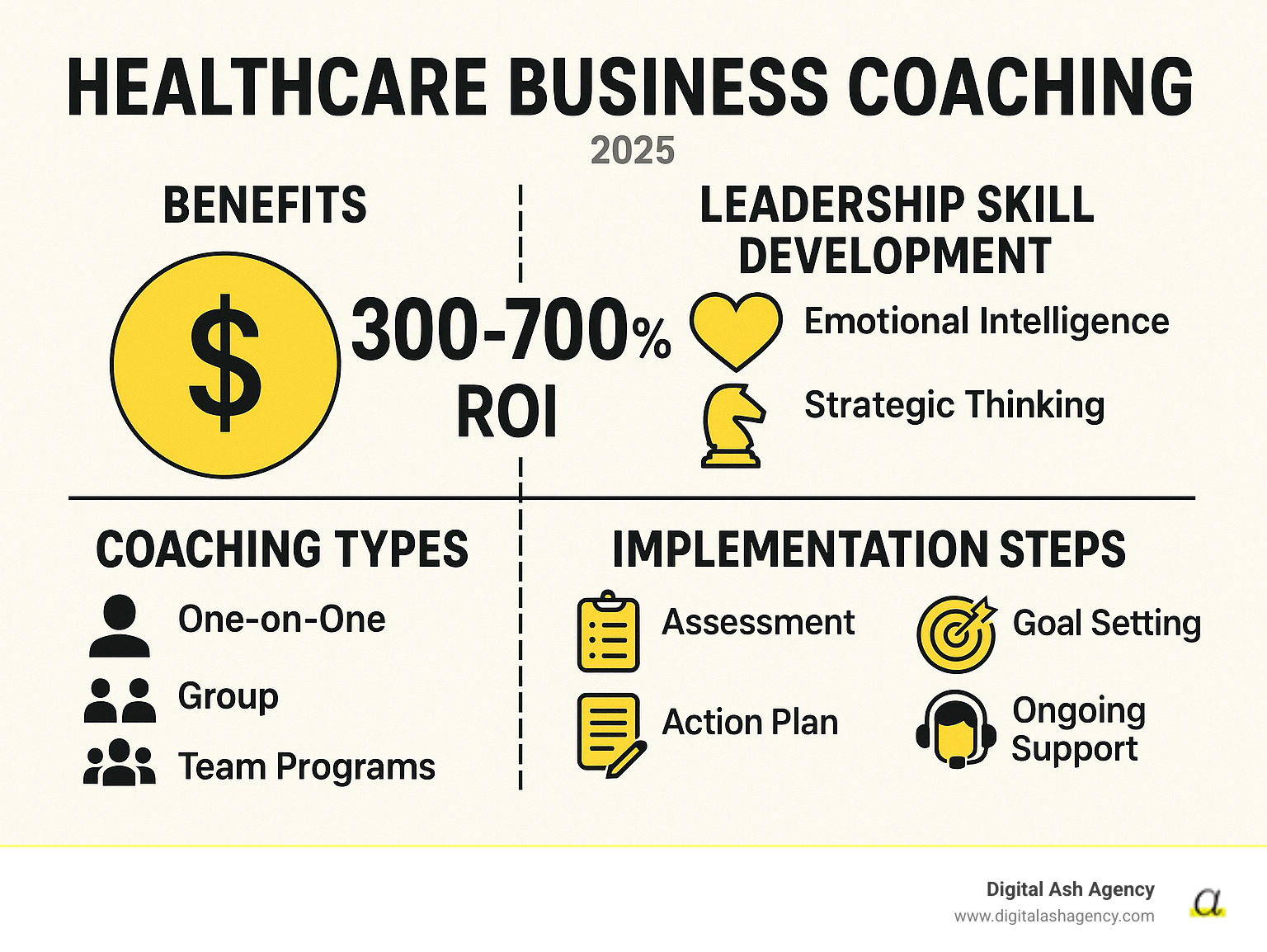
Why Healthcare Leaders Are Turning to Business Coaching for Success
Healthcare business coaching is a specialized form of professional development that helps medical professionals develop the business skills needed to run successful practices. Unlike general business coaching, it addresses the unique challenges healthcare leaders face - from regulatory compliance to patient care standards while building profitable, sustainable organizations.
Key benefits of healthcare business coaching include:
- Leadership Development: 95% of leaders report being better equipped with new behaviors after coaching
- Financial Returns: ROI typically ranges between 300-700% according to FMI Corporation research
- Improved Performance: 80% of coaching recipients see improved work performance
- Better Work-Life Balance: 73% report improved work-life balance after coaching
- Increased Confidence: 94% of leaders experience greater confidence in their roles
The healthcare industry faces unprecedented challenges. Labor shortages plague hospitals and clinics nationwide. Physician burnout rates continue climbing. Meanwhile, rapid technological changes and evolving regulations demand leaders who can steer complexity while maintaining excellent patient care.
Here's the problem: medical school teaches clinical skills, not business management. Most healthcare professionals enter leadership roles without training in strategic planning, team management, or financial oversight. This gap between clinical expertise and business acumen creates struggling practices, stressed teams, and overwhelmed leaders.
Business coaching fills this critical gap. It provides healthcare leaders with the strategic thinking, communication skills, and operational knowledge needed to build thriving practices. Whether you're dealing with non-compete restrictions, competitive market pressures, or team management challenges, coaching offers personalized solutions that drive real results.
I'm Ashley Gay, a branding expert who specializes in helping physicians build successful independent practices even with enforceable non-compete agreements. Through strategic healthcare business coaching principles, my husband's practice billed $239K in the first 90 days and reached nearly $1 million in its first year.

What is Healthcare Business Coaching and Why Is It a Critical Investment?
So, what exactly is healthcare business coaching? Think of it as a dedicated partnership. It's all about empowering you – whether you're a single healthcare professional or an entire organization – to reach your absolute best. We don't just hand you a list of answers or diagnose your problems like a typical consultant. Instead, we dive deep with you, exploring your unique experiences and building on your strengths. Our goal is to help you uncover your own powerful solutions. This whole process is designed to sharpen your decision-making, boost your practice's performance, and confidently tackle those complex challenges unique to the healthcare world.
The truth is, medical schools are fantastic at creating brilliant clinicians. But they often don't teach the vital business skills you need to run a successful practice or lead a healthcare team. This creates a big gap. Many healthcare leaders, who care deeply about their patients, find themselves wrestling with the daily grind of managing a business. Things like keeping an eye on finances, holding onto great staff, or navigating tricky rules. This is exactly where healthcare business coaching becomes a smart and critical investment. It fills that gap, giving you practical, real-world strategies that go way beyond clinical skills. We focus on the daily operations, financial health, and leadership needed for your healthcare business to truly thrive.
The Modern Healthcare Leader's Dilemma
Today's healthcare leaders face a complicated maze of challenges. It's a constant balancing act between giving top-notch patient care and running the complex business that makes it all possible.
Let's look at some of the common struggles:
First, there's the tug-of-war between patient care vs. business operations. Your main focus is, rightly, your patients' well-being. But sometimes, this dedication can make it hard to focus on solid business management. Many practitioners are amazing clinicians but just don't have the business know-how needed to handle tough challenges. This can stop them from growing and staying efficient.
Then there are the endless regulatory problems. The U.S. healthcare system feels like a giant puzzle of rules and compliance needs. Keeping up with these ever-changing rules can feel like a full-time job itself. This takes away precious time and energy that could be spent on patients or growing your practice.
And don't forget the intense competitive market pressures. The healthcare world is getting more and more competitive. Your practice needs to stand out, attract new patients, and keep existing ones happy. This is especially true when patient choices are growing, and marketing is key. It also means understanding and handling issues like non-compete agreements and fierce local competition.
Next up are the team management challenges. From staff shortages and people leaving often, to burnout among healthcare professionals, leading and motivating a high-performing team is tougher than ever. We've seen that important leadership skills – like clear communication, giving good feedback, and inspiring teams – are often not taught in medical school, residency, or nursing school. This creates a big leadership hole. Unfixed internal problems can fester, much like an untreated wound, hurting team spirit and how much work gets done.
Finally, financial oversight is huge. Tight budgets, tricky insurance rules, and the need for steady income mean that understanding money isn't just a nice-to-have anymore. Healthcare leaders absolutely must understand things like how to predict income, manage costs, and build a truly profitable business.
How Coaching Bridges the Gap for Healthcare Professionals
Healthcare business coaching acts like a powerful booster for change. It offers custom solutions to these complex problems. We provide a clear yet flexible path that helps professionals not just survive, but truly thrive in the demanding healthcare world.
Here's how coaching helps bridge that gap:
First, you get personalized development plans. Unlike general training, coaching builds custom plans just for you or your team. These plans focus on your specific needs and goals. Maybe it's improving decision-making for a hospital CEO or boosting communication skills for a practice manager.
We also offer an objective perspective. A coach gives you an unbiased, outside view. This helps leaders spot blind spots and see their business operations more clearly. This fresh look can reveal hidden problems, like gaps in staff training or a mismatch with a supervisor, that you might otherwise miss.
Then there's accountability for goals. We work with you to set clear, measurable goals. And then, we help hold you accountable for reaching them. This structured approach, often using SMART (Specific, Measurable, Achievable, Relevant, Time-bound) goals, keeps you moving steadily toward what you want. For example, a goal might be to "Coach X% of department leaders by Q3, leading to a X% increase in team engagement scores."
Coaching also focuses on fostering resilience and well-being. Burnout is a huge problem in healthcare. Coaching gives you strategies to manage stress, put your well-being first, and build toughness. This helps leaders and their teams face challenges without getting totally worn out. It helps healthcare professionals reconnect with the joy and meaning of their work, which is super important for long-term happiness and staying in the field.
And finally, coaching helps open up hidden potential. Through focused self-reflection and targeted exercises, coaching helps people find abilities they didn't know they had and develop new leadership skills. This process can turn a great practitioner into a true CEO of their business, giving them the power to take charge and drive success.
The Tangible ROI: Key Benefits of Coaching for Leaders and Teams

Think of healthcare business coaching not as an expense, but as a smart investment. It's truly a strategic move that pays off in big ways for your whole organization. We've seen how good coaching leads to better team performance and stronger leaders. It can boost your practice's revenue, lead to happier patients, and help you keep your amazing staff for longer.
It’s all about creating a ripple effect. When leaders grow, everyone benefits.
Developing Core Leadership Competencies
One of the most powerful things about healthcare business coaching is how it helps leaders build crucial skills. These are often the very skills that medical school doesn't teach, but they're essential for running a thriving practice in today's complex healthcare world.
So, what kind of skills are we talking about?
First, coaching helps you develop strategic thinking. This means you'll learn to look beyond today's tasks and envision the future. You'll anticipate challenges and create long-term plans. This includes understanding the big picture of the market, new technologies like telemedicine, and how to set your practice up for lasting success.
Next, you'll gain strong financial acumen. While your clinical skills are top-notch, understanding your practice's financial health is just as vital. Coaching empowers you to make smarter money decisions, understand key numbers (KPIs), predict income, and build profitable business models, like setting up steady revenue streams.
Another vital skill is emotional intelligence (EI). This is all about understanding and managing your own feelings, and those of your team. High EI helps leaders communicate better, build stronger relationships, and create a more positive workplace.
And of course, effective communication is key. Coaching hones your ability to share your vision clearly, give helpful feedback, and truly motivate your team. Better communication builds trust and teamwork, especially when you're making changes or dealing with tough issues.
Finally, coaching helps you master conflict resolution. Disagreements happen in any team. Coaching gives you the tools to handle these moments constructively, work through different opinions, and turn potential friction into chances for growth and stronger team bonds.
The Data-Backed Impact of Healthcare Business Coaching
You don't just have to take our word for it! The benefits of coaching are backed by real data, showing just how much of a difference it can make.
Impressive Return on Investment: A report from FMI Corporation found that leaders who received executive coaching saw an incredible return on investment, often between 300% and 700%. This huge return comes from better business strategy, a stronger team culture, and a healthier financial bottom line. It clearly shows that coaching isn't just an expense; it's a very profitable investment for your practice. You can dive deeper into this research here: An FMI Corporation report on coaching ROI
Improved Performance, Confidence, and Well-being: The benefits of coaching are backed by compelling US-based research. A multi-year survey by Dion Leadership, for example, found that after coaching, a remarkable 95% of leaders felt better prepared to use new behaviors at work. Furthermore, 94% reported feeling more confident, and 81% saw a tangible improvement in their overall well-being. This data clearly shows that coaching delivers improved performance, increased self-assurance, and a better work-life balance, leading to more effective and resilient leaders. Learn more about their findings here: The Dion Leadership Survey on well-being
Reduced Burnout Rates: Burnout is a serious problem in healthcare. But coaching can directly help by focusing on leadership development, building resilience, and promoting a healthy work-life balance. By giving leaders tools to manage stress and practice self-care, coaching helps prevent and even reverse the tough effects of constant stress. This leads to a more sustainable and joyful work environment for everyone.
Finding Your Fit: Types of Coaching for Healthcare Professionals

Think of choosing the right healthcare business coaching approach like prescribing treatment - what works for one practice might not be the best fit for another. The key is taking time to assess your organizational needs, understanding whether you need individual or group focus, and setting clear program goals that align with your practice's unique challenges.
Some practices need intensive one-on-one work with their leadership team. Others benefit more from bringing entire departments together to work through communication issues or align around shared goals. And sometimes, you need a completely different approach that transforms how your whole organization operates.
One-on-One Executive Coaching
When you're dealing with C-suite leaders who carry the weight of major organizational decisions, or physician leaders who are navigating the tricky transition from clinical expert to business manager, individual coaching often provides the most impact.
The beauty of one-on-one coaching lies in its personalized goal setting. Your coach works with you to identify exactly what you need to develop - whether that's improving your executive presence during board meetings, learning to delegate more effectively, or mastering the financial side of running a practice. These aren't generic leadership skills; they're specifically crafted around your role and challenges.
Confidential support is another huge advantage. Let's be honest - when you're in a leadership position, it's not always easy to admit you're struggling with something or need help working through a difficult decision. Having a safe space where you can explore ideas, discuss sensitive situations, and receive honest feedback without worrying about office politics is invaluable.
Many leaders find that this type of coaching acts as genuine career acceleration. By addressing blind spots and sharpening critical skills, you become more confident taking on bigger challenges and handling complex situations that would have stressed you out before.
Team and Cohort-Based Coaching
Sometimes the issue isn't with individual leaders - it's with how teams work together. That's where team and cohort-based coaching shines.
Departmental alignment becomes crucial when you notice different parts of your practice pulling in different directions. Maybe your front office staff has different priorities than your clinical team, or your billing department isn't communicating well with patient services. Team coaching helps everyone get on the same page and work toward shared objectives.
Improving group dynamics can transform a practice. When team members understand each other's working styles and strengths, communication flows better, trust builds, and collaboration becomes natural rather than forced. We've seen practices where simple improvements in team dynamics led to better patient satisfaction scores and reduced staff turnover.
Project-based coaching works well when you're implementing something new - like a new electronic health records system, expanding services, or opening a new location. Having coaching support during these transitions helps teams steer challenges and stay focused on successful completion.
The ultimate goal is fostering a collaborative culture where continuous improvement and mutual support become part of your practice's DNA.
Specialized Methodologies like Open-Book Management
Some coaching approaches integrate specific business methodologies that can completely transform how your practice operates. Open-Book Management is one powerful example that goes beyond traditional coaching.
Financial transparency might sound scary at first - sharing your practice's revenue, expenses, and profitability with all employees. But when done right, it creates amazing results. Employees make better decisions when they understand the financial reality of the business.
Employee engagement skyrockets when staff members feel like true business partners rather than just people who show up for a paycheck. When your medical assistant understands how their efficiency impacts the practice's bottom line, or when your front desk team sees how their patient interaction scores affect revenue, everything changes.
Empowering staff with business data means teaching your team to read and interpret key performance indicators. Suddenly, employees start contributing ideas for improvement, identifying inefficiencies, and understanding exactly how their role contributes to the practice's success.
Creating shared goals and outcomes often includes bonus plans tied to collective performance, giving everyone a stake in the results. When employees see you being open about company processes and finances, trust builds. That increased trust improves employee morale, increases productivity, and creates better patient outcomes. Learn more about open-book principles.
The right coaching approach depends on your specific situation, but the investment in any of these methodologies typically pays dividends in improved performance, better team dynamics, and stronger financial results.
Implementing a Successful Healthcare Business Coaching Program
Starting a healthcare business coaching program isn't like ordering medical supplies from a catalog. You can't just pick a coach and expect instant results. Success requires thoughtful planning, genuine commitment from leadership, and creating an environment where growth can flourish.
Think of implementing coaching like introducing a new treatment protocol. You wouldn't just hand out new procedures without proper preparation, training, and follow-up. The same principle applies here. Gaining leadership buy-in is your first critical step. When practice owners and department heads understand the value and commit to the process, that enthusiasm trickles down through the entire organization.
Setting clear objectives from the start prevents the program from becoming another well-intentioned initiative that fizzles out. What specific challenges are you trying to solve? Are you looking to reduce staff turnover, improve patient satisfaction, or increase revenue? These objectives become your North Star throughout the coaching journey.
Creating a culture of coaching means making development and growth part of your practice's DNA. This isn't about pointing fingers at who needs "fixing." Instead, it's about recognizing that everyone - from seasoned physicians to front desk staff - can benefit from continuous improvement. Leading by example is crucial here. When leaders actively participate in coaching and openly discuss their own growth areas, it removes the stigma and creates psychological safety for everyone else.
The Essential Elements of a Coaching Engagement
Every successful coaching engagement follows a proven pathway, much like how you'd approach a complex patient case. You start with thorough assessment, create a treatment plan, monitor progress, and adjust as needed.
The initial assessment and findy phase is where the real work begins. This isn't a quick chat over coffee. We're talking about a comprehensive evaluation that might include 360-degree feedback, leadership assessments, and honest conversations about current challenges. Think of it as your baseline - you need to know where you're starting before you can measure progress.
SMART goal setting transforms vague hopes into concrete targets. Instead of "I want to be a better leader," we're looking at goals like "Reduce staff turnover in my department by 25% within six months by implementing weekly one-on-one meetings and improving communication protocols." These specific, measurable objectives give both coach and client something tangible to work toward.
Crafting a strategic roadmap takes those goals and breaks them into actionable steps. This isn't a rigid schedule carved in stone, but rather a flexible guide that outlines milestones, resources needed, and realistic timelines. It's your GPS for the coaching journey - you know your destination and have a route planned, but you can adjust if you hit unexpected roadblocks.
Regular check-ins and feedback loops keep momentum alive. These aren't just status meetings where everyone nods politely. They're working sessions where real challenges get addressed, wins get celebrated, and strategies get refined. The frequency depends on needs and preferences, but consistency is key.
Ongoing support and adaptation recognizes that healthcare is dynamic. New regulations emerge, staff changes happen, and market conditions shift. Effective coaching adapts to these realities, providing continued guidance as circumstances evolve.
Measuring the Impact of Your Healthcare Business Coaching Investment
Here's where we separate the feel-good stories from genuine business results. Measuring coaching impact isn't about collecting testimonials (though those are nice too). It's about tracking concrete metrics that show real improvement in your practice's performance and your team's well-being.
Key Performance Indicators (KPIs) provide the hard data that CFOs love to see. We're talking about measurable improvements in practice revenue, patient volume, and operational efficiency. One practice we know of saw a 31% increase in collections - that's $440,000 - without adding a single provider. Another tripled their monthly revenue and hit six-figure monthly numbers while actually working fewer days.
Employee engagement scores tell you whether your team is truly bought into the vision or just going through the motions. Higher engagement typically translates to better patient care, fewer sick days, and a more positive atmosphere. You can measure this through regular surveys, but also watch for subtler signs like increased participation in meetings or staff suggesting improvements.
Staff turnover rates are particularly telling in healthcare, where replacing a skilled nurse or medical assistant is both expensive and disruptive. When coaching helps develop better managers and creates a more supportive work environment, people stay. This saves money on recruitment and training while maintaining continuity of care for your patients.
Patient satisfaction surveys reflect the downstream effects of better leadership and teamwork. When your staff feels supported and engaged, patients notice. They experience better communication, shorter wait times, and more attentive care. These improvements show up in online reviews and word-of-mouth referrals.
Practice profitability and growth ultimately determine whether coaching was worth the investment. We track profit margins, revenue per patient, and overall business expansion. One practice owner went from dipping into personal savings to pay rent to generating dependable profits. Another brought in more revenue in a single week than they had in the entire previous year.
The beauty of measuring these metrics is that they create a positive feedback loop. As you see improvements, it reinforces the value of coaching and encourages continued investment in your team's development.
Conclusion: Your Prescription for a Thriving Practice
Phew! We've covered a lot of ground, haven't we? It's clear that healthcare business coaching isn't just a quick fix. Think of it more as a powerful engine for change. It’s designed to help healthcare professionals and organizations here in the U.S. tackle those big, unique challenges head-on. We've seen how it perfectly bridges that gap between amazing clinical skills and the sharp business know-how needed today. It truly empowers leaders to steer tricky rules, stand out in crowded markets, and build strong, happy teams.
And the best part? The benefits aren't just warm fuzzy feelings; they're backed by real data! We're talking about fantastic returns on investment, better work performance, sharper leadership skills, and even less burnout. Whether you choose personalized one-on-one executive coaching, or you opt for collaborative team development, or even dive into specialized methods like open-book management, the core idea is always the same: creating a space where both your people and your practice can truly shine.
Starting a successful coaching program is like planting a seed for continuous growth. It means leaders get on board, set clear goals, and show the way. By focusing on key steps like a good initial assessment, setting those SMART goals (Specific, Measurable, Achievable, Relevant, Time-bound, remember?), and offering ongoing support, you build a strong foundation. And when you measure your progress carefully – looking at things like KPIs, employee engagement, and patient satisfaction – you can actually see your investment bringing real, lasting results. It’s all about making sure every dollar spent truly pays off.
In this fast-changing healthcare world, think of healthcare business coaching as your ultimate prescription for a thriving practice. It gives you the power to lead with confidence, build an incredible team, and find long-term success. And speaking of success, we at Digital Ash Agency truly get the ins and outs of marketing and networking in healthcare. We specialize in building those vital relationships and helping practices flourish, even when dealing with tough non-compete agreements or super competitive markets.
So, are you ready to open up your practice's full, amazing potential? We'd love to help you get there. Let's develop your practice's growth strategy with us!








